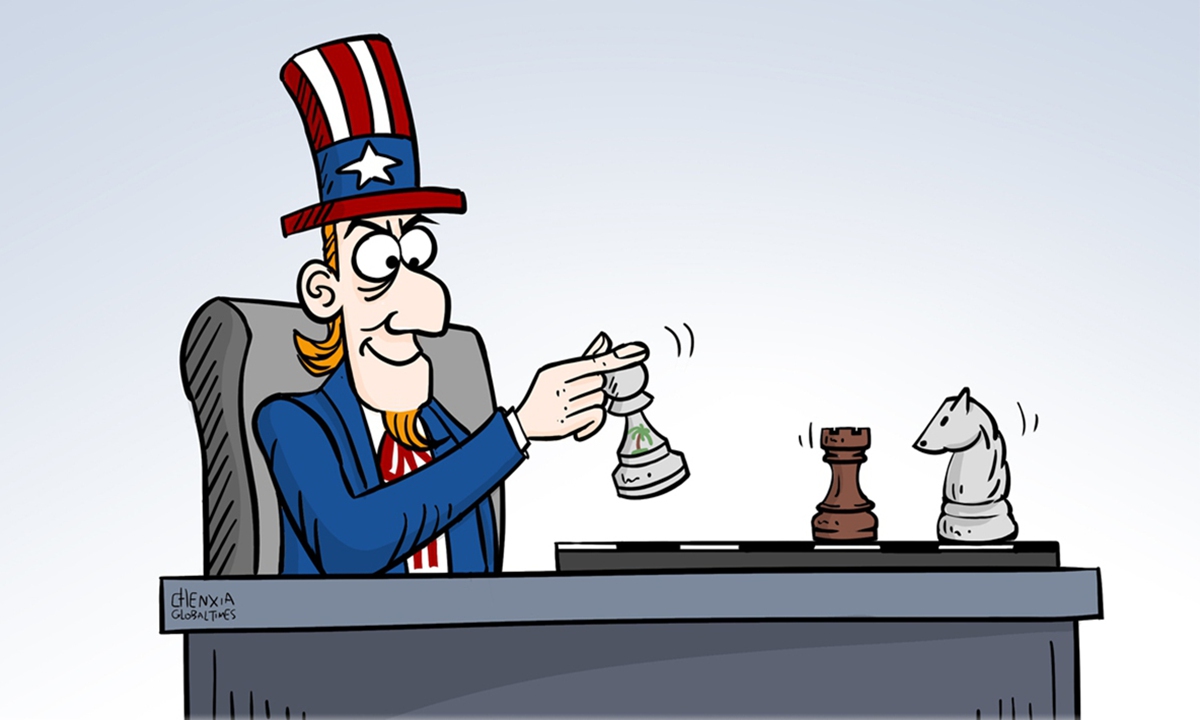
Illustration: Chen Xia/GT
On September 28 and 29, US president Joe Biden convened a "first ever" US-Pacific Islands Country Summit in Washington. It is widely believed that the meeting is part of the Biden administration's diplomatic campaign in the South Pacific region to restore the US' geostrategic hegemony, with a professed aim to contest with and contain China's successful economic cooperation with the island countries.
After taking office in 2021, the Biden administration has reaffirmed China's position as the US' biggest rival both politically and economically. There has been an obsessive nervousness in Washington with the perceived prospect of losing its global and regional dominance.
The South Pacific region used to be a neglected, out-of-the-way corner of the world for the US. From 1946 to 1996, the US, UK and France detonated 318 nuclear devices in the Pacific region, with 67 tests carried out by the US army in the Marshall Islands alone. Radiation poisoning, birth defects, leukaemia, thyroid and other cancers became rampant among the islanders, in addition to devastating ecological hazards and damages to the local environment, which are still lingering today.
At the end of the Cold War, Washington apparently identified the South Pacific region of having lower or little strategic value. Embassies were shut down, aid programs pulled out and financial support drastically reduced.
The Pacific Island countries had long suffered from Western enslavement, exploitation and deprivation during colonial times, resulting in extremely weak economies, poor infrastructure and prevalent poverty.
China opposes the condescending approaches of Western powers, which always hand out economic largesse with political strings attached. Their third world recipients have to pledge allegiance to Western political systems and ideologies, and are reduced to tools in the West's geopolitical power game.
However, China's engagement with the Pacific Island countries has been based on the principle of mutual respect and mutual benefits. In recent decades, China's aid programs, investment projects and other business initiatives have brought tremendous changes and economic development to the countries of the region. Governments and peoples of the Pacific Island countries have substantively benefited from the tangible outcomes of their cooperation and exchanges with China.
China's success in the Pacific region has spurred a neurotic strategic apprehension in Washington, with a recent flurry of frenetic diplomatic outreach to the island countries. Since the start of this year, there have been a series of high-level visits, forums and a lot of promises of aid programs and commitments from the US, along with a ferocious scare and smear campaign to vilify and demonize China and China cooperation ventures in the region.
The Biden administration has sugar coated its strategic offensive with buzzwords such as "shared history, values, and people-to-people ties." However, they seem to have missed the most important keywords to sound international relations, which is respect and equality. Arrogance and distain toward other countries' independence and sovereignty will only result in distrust and antipathy.
As Prime Minister of the Solomon Islands Manasseh Sogavare said in his recent address to the United Nations General Assembly, the West has been unfairly targeting his country with "a barrage of unwarranted and misplaced criticisms, misinformation and intimidation" simply because of its successful and fruitful cooperation with China. Such flagrant interference with the small island country's domestic affairs "threatens our (the Solomon Island's) democracy and sovereignty."
Washington apparently regards the Pacific Island countries as merely handy chess pieces, to be instrumentalized and even weaponized to serve its regional and global hegemonic strategy. The Biden administration seems to believe that the Pacific Island countries' leaders would regard it as a privilege to be summoned to a summit in Washington, as if such a gesture would really signify the US' "return to the Pacific."
As a matter of fact, they underestimate the political wisdom and judgement of the people of the island countries. All buzzwords are hollow and void as long as they could not provide any substantive deliverables.
China has no intention to compete with anyone for influence or to engage in geographical competition. With an open mind and in accordance with the willingness of Pacific Island countries, China is ready to continue to carry out cooperation with other countries, including the US, in the South Pacific region, so as to, in the words of State Councillor and Foreign Minister Wang Yi, "give full play to respective advantages of all sides and form greater synergy."
The author is professor and executive director of Asia Pacific Studies Centre, director of Australian Studies Centre, East China Normal University. opinion@globaltimes.ocm.cn




